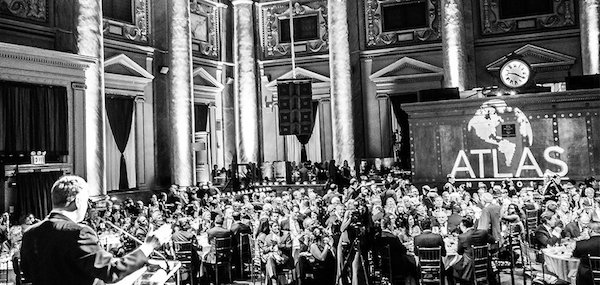Aram Aharonian and Álvaro Verzi Rangel, co-directors of the Observatory in Communication and Democracy (OCD) and Latin-American Centre of Strategic Analysis (CLAE), wrote a detailed analysis of the Atlas Network and its deep impacts in Latin America. We will be sharing a translated version of this article in parts, the first part is about the network itself and the later parts will address specific country cases.
The capitalist international exists, it mobilizes the libertarian movement of right-wing, they are known as “libertarians” and it is obviously very well financed. It works through an immense conglomerate of foundations, institutes, NGOs, centers and societies united by undetectable threads, which include the Atlas Economic Research Foundation or the Atlas Network.
In the Latin American Forum on Liberty of the Atlas Network, held in May 2017 in the luxurious Brick Hotel in Buenos Aires, in the presence of Argentine President Mauricio Macri and the Peruvian-Spanish writer Mario Vargas Llosa, it was discussed how to defeat socialism at all levels, from the battlefields on the university campuses to the mobilization of a country to embrace the removal of a constitutional government, as in Brazil.
It is important to note that several leaders associated with Atlas managed to gain notoriety recently: several ministers of conservative Argentine government, Bolivian senators and leaders of Free Brazil Movement (MBL), who helped to overthrow the president Dilma Rousseff, according to Lee Fang’s thorough report in The Intercept [Sphere of Influence: How American Libertarians Are Remaking Latin American Politics, The Intercept, August 9, 2017].
The network that helped to alter the political power in various countries is a tacit extension of the U.S. foreign policy–the think tanks associated with Atlas are financed by the State Department and the National Endowment for Democracy (NED), a crucial arm of the American soft power and directly sponsored by the Koch brothers, powerful ultraconservative billionaires [Charles G. Koch and David H. Koch].
The NED and the State Department, which count on public entities working as operation centers and deployment guidelines and funds such as the Pan American Development Foundation (PADF), Freedom House and United States Agency for International Development (USAID), are the major entities who share guidelines and resources, in exchange for concrete results in the asymmetric war in which they participate.
Atlas works with 450 foundations, NGOs, think tanks and advocacy groups, with an operating budget of 5 million U.S. dollars (2016), given by their “charitable and nonprofit” foundations. It has supported among others the MBL and organizations that participated in the offensive in Argentina, such as Creer y Crecer and Pensar foundations, a think tank of Atlas, who joined the party (Republican Proposal, PRO) created by Mauricio Macri; the opposition forces in Venezuela and Sebastian Piñera, right-wing candidate in the Chilean presidential elections.
The network has 13 affiliated entities in Brazil, 12 in Argentina, 8 in Chile and Peru, 5 in Mexico and Costa Rica, 4 in Uruguay, Venezuela, Bolivia and Guatemala, 2 in Dominican Republic, Ecuador and El Salvador and 1 in Colombia, Panama, Bahamas, Jamaica and Honduras.
The leaders of the MBL and the Fundação Eléutera–a group of highly influential neoliberal “experts” in the Honduran post coup d’état scenario–received funding from Atlas and became part of the new generation of political actors who attended training seminars in the U.S.
The “modern” right-wing is the right-wing libertarian movement that today raises the Republican flag, whose actions are based on a deliberate strategy of misinforming the majorities to impose its plutocratic policies and in Latin America, the Atlas Network is their main supporter.
The promoter of this movement is the multi-millionaire Charles G. Koch, who adopted the thesis of James McGill Buchanan–economist at the University of Chicago and Nobel Prize winner– to disarm the progressive State, with an operative strategy in defense of the sanctity of private property rights and to subdue the government model: for capitalism to prosper, it is necessary to put chains on democracy, he argued.
Some of the 15 most important organizations financed by Koch are: Americans for Prosperity, Cato Institute, Heritage Foundation, American Legislative Exchange Council, Mercatus Center, Americans for Tax Reform, Concerned Veterans of America, Leadership Institute, Generation Opportunity, Institute for Justice, Independent Institute, Club for Growth, Donors Trust, Freedom Partners and Judicial Watch. There are more than 70 such organizations of the State Policy Network (SPN).
The Centre for International Private Enterprise (CIPE) is a foundation affiliated with the NED, created by the U.S. government to prosecute the goals of Washington’s foreign policies, which finance the developing political organizations around the world. It was set up by the Foundation Chamber of commerce of the U.S., the largest lobby in the country. 96% of its funds come from the State Department and USAID. CIPE played a primary role in the financing of the Atlas network and was the main force in strengthening the network. Since 1991, Alejandro Chaufen, the Argentine apologist of the bloody Argentine dictatorship, directs the Atlas Network.

